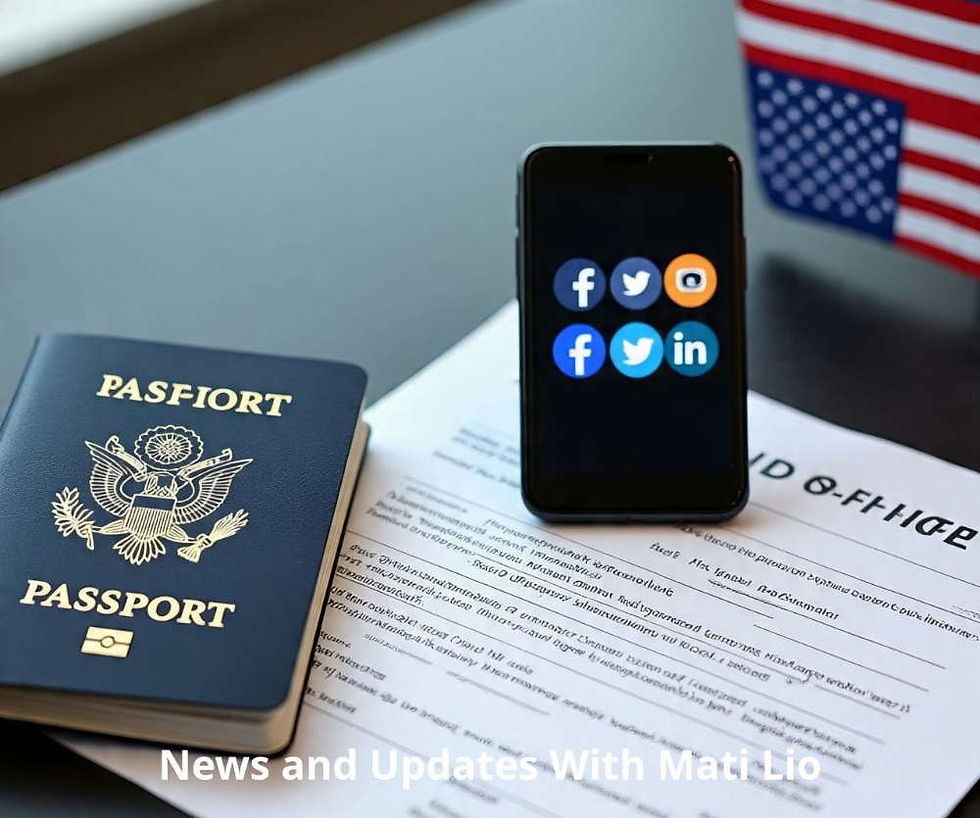New U.S. Visa Rule: All Applicants Must Disclose 5-Year Social Media History
- Mati Lio
- Aug 19, 2025
- 3 min read
Updated: Aug 20, 2025

The United States now requires every visa applicant, including tourists, workers, students, and immigrants, to disclose all social media usernames or handles used in the past five years on the DS-160 visa application form. The U.S. Mission in Nigeria confirmed this directive on its official X (Twitter) account, emphasizing that applicants must certify the accuracy of their information and warning that omissions may result in visa rejection or affect future eligibility.
This requirement is part of broader enhanced screening measures introduced by the U.S. Department of State. For certain visa categories—specifically F (student), M (vocational student), and J (exchange visitor)—applicants must ensure their social media profiles are set to public so consular officers can review activity during the visa process.
---
Key Highlights of the Policy
1. Comprehensive disclosure: All applicants must list every social media username or handle used over the past five years, even inactive or deleted accounts.
2. Certify accuracy: Applicants must affirm that all information, including social media handles, is true and correct on the DS-160 form.
3. Consequences for omission: Deliberate or accidental omissions may result in visa denial or affect future eligibility.
4. Public profile rule for F, M, J visas: Students and exchange visitors must make social media profiles public to allow consular officers to review online activity.

What You Should Do
Compile a complete list of social media handles used over the last five years.
Certify the accuracy of your social media information on the DS-160 form.
Students/exchange applicants (F, M, J): Switch relevant social media profiles to public settings before applying and keep them public until your visa decision is finalized.
Double-check all information: Typos or missing platforms could trigger delays or denial—even if accidental.
---
Why This Matters
This policy reflects the U.S. government’s effort to strengthen national security by reviewing applicants’ digital footprints. While some critics have raised privacy concerns, compliance is mandatory. Proper preparation is now critical for anyone seeking a U.S. visa.
---
📢 Need Help with Your Study Abroad Dream or Academic Writing Tasks?
Whether you need help with searching for scholarships and schools to study abroad, admission application guidance, crafting your admission essays, Statement of Purpose (SOP) or Personal Statement, research proposals, or any academic documents—I'm here to support you.
💬 Enjoy a FREE 30-minute consultation on any of my available services to get started with confidence!
---
Disclaimer
This article is for general informational purposes and does not constitute legal or immigration advice. Visa requirements may change without notice. Always consult the official U.S. Department of State or the nearest U.S. embassy/consulate for the latest guidelines. For personal concerns, consider speaking to a qualified immigration advisor.
----
Sources
CNN Travel – Context on enhanced vetting and privacy considerations
Daily Post Nigeria – Public profile requirement for student/exchange visas.
Diplomatic Digest – Public social media rules for students and exchange visitors.
Economic Times – Analysis of social media vetting for student visas.
Sahara Reporters – Confirms social media requirement and possible consequences.
The Nation Online (Nigeria) – Details on the directive and eligibility implications.
Washington Post – Coverage on U.S. visa social media policies.
Times of India – International reporting and context.
U.S. Embassy Mali (via State.gov) – Rules for F, M, and J visa applicants
U.S. Mission Nigeria (Twitter/X handle) – Official announcement requiring social media handles on DS-160




Comments